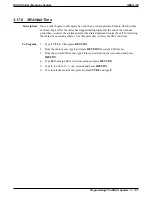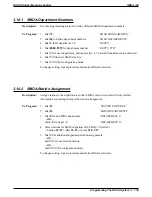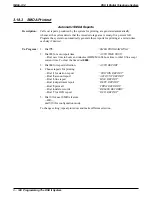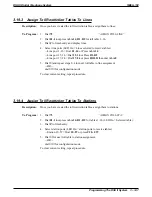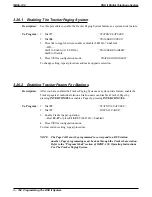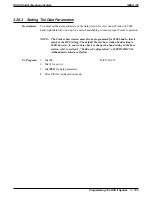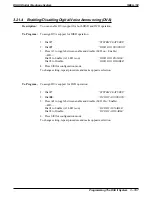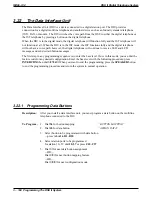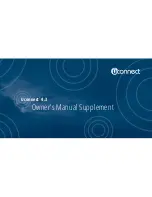
3.19.1
Assign Entries To Toll Restriction Tables
Description:
Plan and execute system toll restriction in the sequence detailed in the following steps.
1. Determine the types of dialing restrictions that you wish imposed on the system.
Typically, this includes access codes which result in toll charges, and certain local
numbers as desired.
2. If you wish the restricted dialing codes to be imposed consistently on most or all
stations in the system, list them on one or two tables. If you must allow for a wide
variation in the dialing restrictions, spread the listing out across several tables.
3. Strategically group the listings on the tables so that a list of restrictions can be
applied to a particular station or group of stations.
4. Designate each table as a DENY table or as an ALLOW table. The system prevents
the dialing of numbers entered in a DENY table. ALLOW tables take precedence
over DENY tables. Therefore, an entry in an allow table will provide an explicit
exception to an entry in a DENY table. Note that the system always permits the
dialing of any number not explicitly denied. Also, note that the system will not toll
restrict system speed dial numbers unless you specify them to be restricted with a
separate programming step.
Example A: Provide a simple and broad toll restriction format by creating a DENY
table with two entries: ENTRY (1) = 1; ENTRY (2) = 0. This format prevents all
long distance and operator calls.
Example B: Prevent the dialing of all numbers within the (804) area code, while
allowing the dialing of one specific number within that area code. by entering 1804
in a DENY table and 18049782200 in an ALLOW table.
5. Press the # button in place of a particular digit to condense a range of numbers into
one entry. The # character is a “match-anything” digit, and can be included in an
entry in either a DENY table or an ALLOW table.
Example A: If 357, 377, 387, and 397 dialing is to be prohibited, list one entry of
3#7 on a DENY table to cover them all.
Example B: Since area codes typically have a 1 or a 0 as a middle digit, prevent
long distance calls to those area codes by entering 1#1# and 1#0# in an DENY table.
6. Since it is important that emergency numbers never be restricted, always create an
allow table with entries of 911 and 1911 to override any DENY tables that you have
created.
7. If the system is installed behind a PBX, include an access code as part of every table
entry.
8. The system defaults two toll restriction tables with preprogrammed values and
assigns them to the lines. You need only to assign them the stations to put them into
effect. The preprogrammed values are as follows:
Default Toll Restrictions
Table 1 = Deny
Table 2 = Allow
Entry 1 = 1
Entry 1 = 1800
Entry 2 = 976
Entry 2 = 911
Entry 3 = 411
Entry 4 = 0
DSU II Digital Telephone System
IMI66–132
Programming The DSU II System 3 – 145
Содержание DSU II
Страница 31: ......







